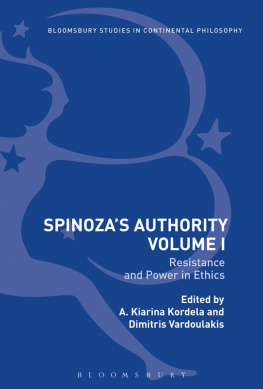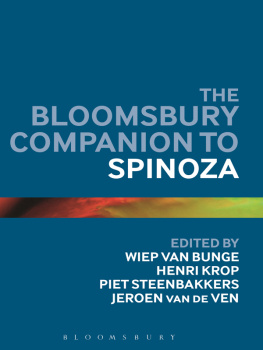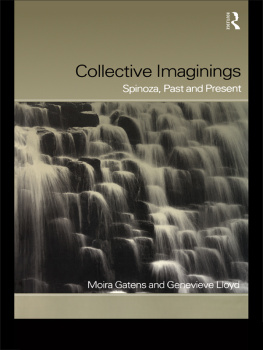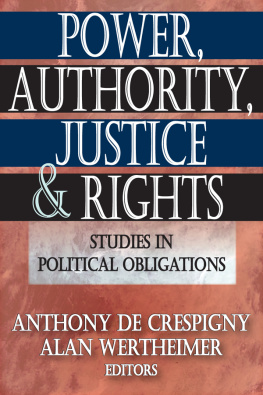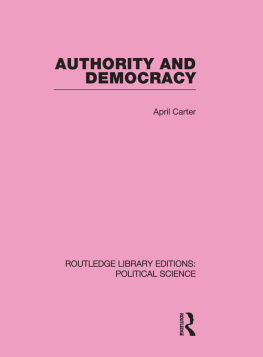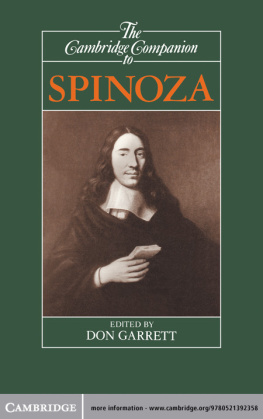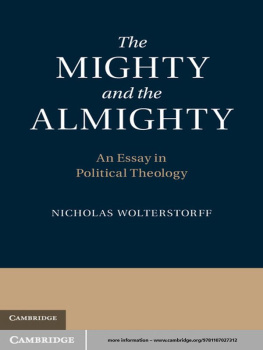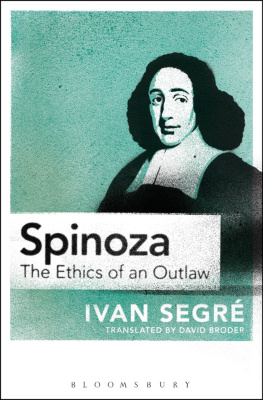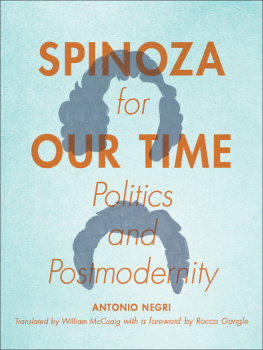Spinozas Authority Volume I:
Resistance and Power in Ethics
Also available from Bloomsbury
Conflict, Power, and Multitude in Machiavelli and Spinoza, Filippo Del Lucchese
Spinoza and the Specters of Modernity, Michael Mack
Between Hegel and Spinoza, edited by Hasana Sharp and Jason E. Smith
Spinoza: Ethics of an Outlaw, Ivan Segr
Spinozas Authority Volume II, edited by A. Kiarina Kordela and Dimitris Vardoulakis
The Role of God in Spinozas Metaphysics, Sherry Deveaux
Bloomsbury Companion to Spinoza, edited by Wiep van
Bunge, Henri Krop, Piet Steenbakkers and Jeroen van de Ven
Spinozas Authority Volume I:
Resistance and Power in Ethics
Edited by
A. Kiarina Kordela and Dimitris Vardoulakis
Bloomsbury Academic
An imprint of Bloomsbury Publishing Plc

A. Kiarina Kordela and Dimitris Vardoulakis
Just as in the 1960s the pessimism about dialectical materialism was giving way to a new hope that Marxist dialectics can be amended or augmented by Spinozas anti-teleological philosophy, a new, seemingly intractable problem arose. Namely, the problem that the more one opposes regimes of power, the more this opposition strengthens the structural system that makes such regimes possible. As Foucault puts this point somewhere: Anyone who attempts to oppose the law in order to found a new order will encounter the silent and infinitely accommodating welcome of the law. The law does not change: it subsided into the grave once and for all, and each of its forms is only a metamorphosis of that never-ending death. This problem is even more acute in neoliberal governmentality, where it becomes increasingly difficult to identify even a target to oppose or resist, given that executive government cedes a lot of its power to capital.
This may suggest that optimism of the will in the face of the pessimism of the intellect is even more urgent todayand yet such a stance is precarious for a Spinozist who would be suspicious not only of any concept of the will but also of the very idea of hope, given what Spinoza has to say about the will and about hope in his works.
The wager of the present two collections is that we may be better served by paying close attention to what Spinoza says about authority. Examining Spinozas authority in the full range of its significationsas prophetic authority or as sovereignty, as power or as authoritative process of interpretationwe may be able to evade the dilemma between pessimism and optimism. In fact, we may be able to steer a path that shows how resistance is possible because authority is ever present as obedience or as the sad emotions that decrease our power.
We are thankful to all of our contributors as much for the final products that appear in the form of these thoughtful essays as for what came before that: their enthusiastic engagement in conference panels and workshops that have helped us all shape our ideas as we were putting them down in essay forms. These events include: the seminar on Spinozas Authority, organized by Dimitris Vardoulakis, which took place at the University of Western Sydney, in Sydney, Australia, in August 2012; the thematic stream on Spinozan Politics at the London Conference on Critical Thought, organized by Filippo Del Lucchese and Dimitris Vardoulakis, which took place at the Royal Holloway, University of London, in June 2013; the seminar on Spinozas Authority: Resistance and Power at the conference of the American Comparative Literature Association, organized by Siarhei Biareishyk and A. Kiarina Kordela, which took place at the New York University in New York, in March 2014; and the workshop on Spinozas Theologico-Political Treatise, organized by Stathis Gourgouris and Dimitris Vardoulakis, which took place at Columbia University in New York, in November 2015.
References to Spinozas works
The various translations of Spinozas works offer often significantly different interpretation of the meaning of his original Latin text. For this reason, the contributors have been free to choose their preferred translation, or to translate themselves the Latin from the established text of Spinozas works in the Gebhardt edition of the Opera.
The following abbreviations of specific works have been used:
E = Ethics [Ethica]
The Roman numeral in capital following E indicates the part of the Ethics. For example, E I is Ethics, Part I, E II is Ethics Part II, and so on. The following abbreviations have been used here:
A = Axiom
Ap. = Appendix
C = Corollary
D = Definition
L = Lemma
P = Proposition
Pr = Proof
Pref = Preface
S = Scholium
So, for instance, E II, P7 refer to Ethics, Part I, Proposition 7. And, E IV, P34S refers to Ethics, Parts IV, Scholium to Proposition 34.
Other abbreviations to Spinozas works
TIE | (Treatise on the Emendation of the Intellect): cited by paragraph number. |
Ep. | (The Letters): cited by letter number. |
PC | (Principles of Cartesian Philosophy). |
ST | (Short Treatise). |
TP | (Tractatus Politicus): cited by chapter followed by paragraph number. |
TTP | (Tractatus Theologico-Politicus). |
The contributors indicate in each chapter which edition of the above works they prefer to use.
A. Kiarina Kordela
Barely a reader of Spinozas Ethics could fail to notice that this work far exceeds the scope of its title. Already by reading the first pages we find ourselves enwrapped first of all in a theologyand one might add, a secular theologywhich quickly reveals itself to be simultaneously an ontology and an epistemology, to mention only the most eminent subject matters of Spinozas rather short book. The first of the two volumes of our collection on Spinozas Authority brings to the foreground another, perhaps less conspicuous, aspect of the Ethics, namely, that it is also a work on political philosophy.
The itinerary of the nine essays in this volume could be briefly described as follows. (1) We begin with Dimitris Vardoulakis introducing us to two of Spinozas many unorthodox positions, and specifically his intertwining of equality and power, and his politicization of the ontological, with which Spinoza opposes the entire Aristotelian tradition of egalitarianism and the assumption of an ante-political space. (2) Spinozas next heresy concerns his concept of freedom, which, as Aurelia Armstrong argues against its liberal political interpretation as a product of self-perfection, can emerge only as an effect of internal (individual) and external (social) relational interactions. (3) Such interrelations between singularity and the common bring us to the issue of conatus, whose interconnections with potestas and potentia are unfolded in Cesare Casarinos reading of Gilles Deleuzes thesis that resistance (potentia) comes before power (potestas) through the Spinozan principle that truth is the standard both of itself and of the false. (4) One of the most fundamental concerns of potestas and the state is legitimacy, which, as Juan Domingo Snchez Estop shows, in opposition to the dominant contractual theories of political legitimacy, Spinoza considers to be an effect of the imagination, so that the state has essentially no proper existence. (5) The centrality of the imagination to the political culminates in Joseph Hughes essay which argues, against Alain Badiou, that Spinozas method of proof involves discovery, historicity and the potential of radical retroactive reconstitution of sense, so that neither proof nor the political can be reduced to mathematical logic. (6) Antonio Negri returns to his distinction between
Next page
